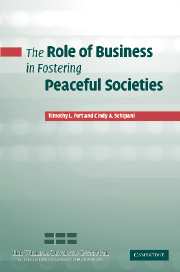Book contents
- Frontmatter
- Contents
- List of tables
- Acknowledgements
- Introduction
- Part I The plausibility of connecting business and peace
- 1 The role of business in fostering sustainable peace
- 2 Balances of power and mediators of justice
- Part II Current standards and their amenability to peace
- Part III Two illustrative issues: gender equality and ecology
- Conclusion
- Index
2 - Balances of power and mediators of justice
Published online by Cambridge University Press: 22 September 2009
- Frontmatter
- Contents
- List of tables
- Acknowledgements
- Introduction
- Part I The plausibility of connecting business and peace
- 1 The role of business in fostering sustainable peace
- 2 Balances of power and mediators of justice
- Part II Current standards and their amenability to peace
- Part III Two illustrative issues: gender equality and ecology
- Conclusion
- Index
Summary
Corporations are faced with demands to be fair and just. Responding to these demands entails considerations of morality and politics that are connected to perceptions of justice. Economic imperatives and competitive pressures may make consideration of political and moral goals beyond the scope of corporate responsibility. Historically, there may be some justification for this reticence, an issue addressed in chapter 3, but the twenty-first century may not replicate the geopolitical conditions of previous centuries. In large part, this may be due to the balances of power that exist among various institutions including nation-states and multinational corporations, and the relationship corporations have with governments and nongovernmental organizations (NGOs). Thus, in order to address the balance of power issues and their relevance to sustainable peace this chapter: (1) describes selected contemporary theories as to how peace can be achieved; (2) examines the debate as to whether democracy is a form of government most suited for creating sustainable peace; (3) articulates a way in which businesses can contribute, if not to democracy, at least to participatory governance models that foster sustainable peace; and (4) concludes with a preliminary set of traits that suggest dimensions of corporate governance relevant to fostering sustainable peace. Corporations cannot be responsible for political dimensions, but they can attend to aspects such as participation and respect for voices of constituents.
- Type
- Chapter
- Information
- The Role of Business in Fostering Peaceful Societies , pp. 41 - 88Publisher: Cambridge University PressPrint publication year: 2004



